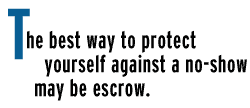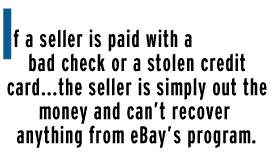| |||||||||

Sticking it to auction winners
 Online payment services may be great for sending money to Mom but not so great when the recipient is not exactly a saint. Online payment services may be great for sending money to Mom but not so great when the recipient is not exactly a saint. E-payments are increasingly used to settle accounts at eBay and other online auction sites. But a new study by the National Consumers League finds that 41 percent of auction buyers say they had problems after paying for goods. These problems, which consumers can't easily reverse if e-payments are used, included • Receiving items that were different than described. • Receiving items that were damaged or defective. • Finding that deliveries took much longer than expected--or never arrived at all. E-payments can transfer money quickly from buyer to seller. But they don't have the same protections that consumers have learned to expect from credit cards.
For example, say you use an online payment service to send money for an item. If that item isn't delivered to you in satisfactory condition, getting your money back from an e-payment service may be a lot more difficult than if you had paid with plastic. In the United States, the Federal Trade Commission enforces rules ensuring that credit card users aren't liable for more than $50 in unauthorized charges; can withhold payment for disputed charges (which the credit-card company must investigate promptly; and can even dispute authorized charges if the goods delivered are of poor quality. (The last rule applies only if the seller is in your home state or within 100 miles of your address) Other countries' laws vary, but typically provide at least some assurances for credit card users. By contrast, online payment services tend to restrict the dollar amounts they must pay out, rather than limiting a consumer's liability to $50. For example, the user agreement of the largest e-payment service, PayPal, offers a maximum of $200 to distraught buyers of eBay items. PayPal's offer doesn't kick in until a buyer has completed eBay's own claim process. eBay's plan covers victims of fraud up to $200, after a $25 deductible. To qualify for PayPal's extra coverage, both buyer and seller must be PayPal members, must be U.S. residents, and must have applied for PayPal's "Verified User" program. While PayPal offers its $200 coverage to sellers as well as buyers, eBay doesn't cover sellers at all. If a seller is paid with a bad check or a stolen credit card--or a valid credit card transaction is later disputed and reversed--the seller is simply out the money and can't recover anything from eBay's program. PayPal Executive Vice President Reid Hoffman says his company started offering auction participants $5,000 in fraud protection last year. But the higher limit survived for only a three-month period, from August through November. Too many people submitted fake claims seeking thousands of dollars of payouts, he says. Since November, "We currently don't guarantee the legitimacy of the transaction," Hoffman said, other than PayPal's $200 maximum amount. "We're trying to extend the guarantee to higher (dollar) levels without getting scammed," he added, but the date when this protection might increase is unknown. Another e-payment service, Ecount, specifically states in its posted terms that it won't refund any money a buyer sends a seller, even if no item is received. Ecount's vice president of operations, Paul Flanigan, said, "Our model's a little different" than services that provide insurance. "Some of the protections of an escrow service are not covered by our product." An escrow service is an e-payment service that releases money to a seller only when a buyer acknowledges that an item was received in good condition. eBay itself recommends the Tradenable escrow service for large purchases. There's no doubt that some people have had problems receiving auction items. The best way to protect yourself against a no-show may be escrow. Consumer advocate Brian Livingston appears at CNET News.com every Friday. Do you know of a problem affecting consumers? Send info to tips@BrianLivingston.com. He'll send you a book of high-tech secrets free if you're the first to submit a tip he prints.
on the soapbox |
|
|||||||||||||||||||||||
|
Send us news tips | Contact Us | Corrections | Privacy Policy |
|

